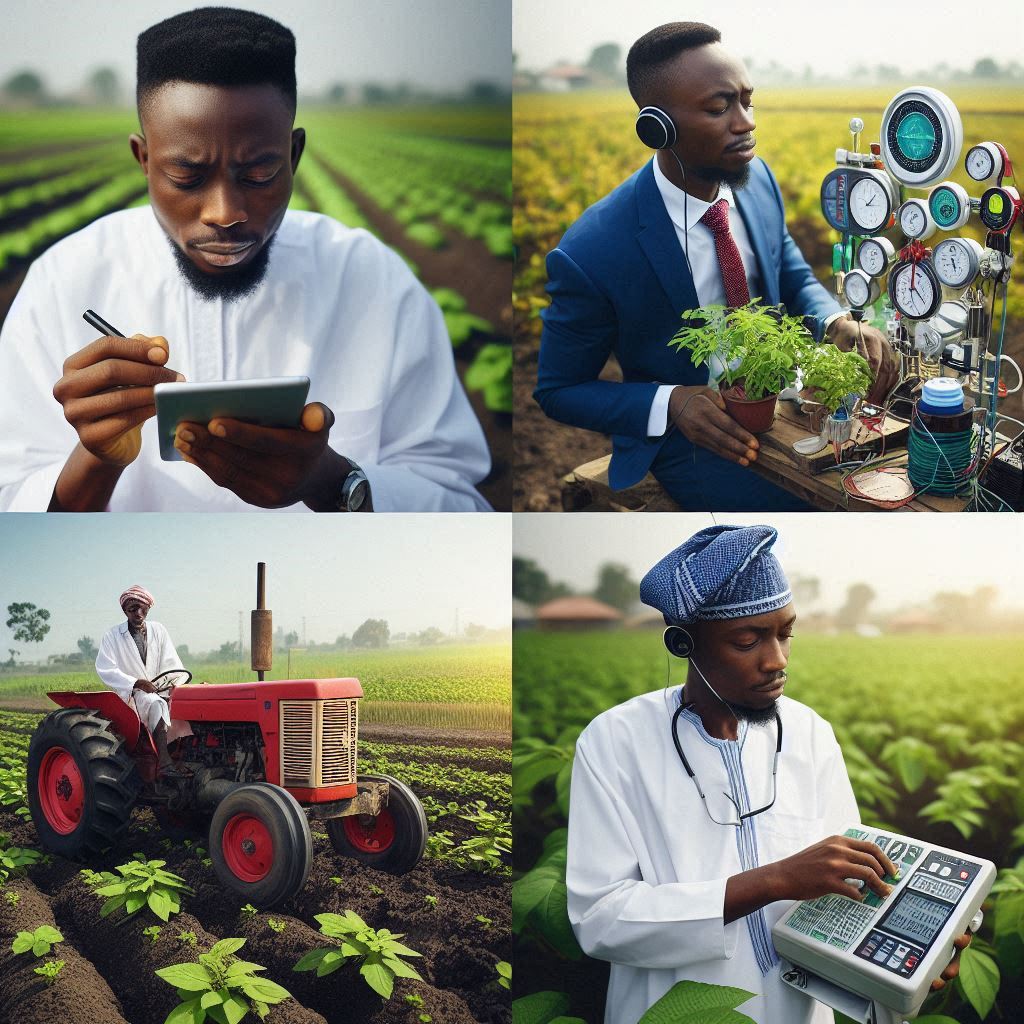Introduction
Agricultural science education plays a crucial role in Nigeria’s development as it is the backbone of the economy. However, the sector faces numerous challenges that hinder its progress.
Importance of Agricultural Science Education
Agricultural science education equips individuals with the necessary skills and knowledge to contribute to the agricultural sector’s growth. It also helps in promoting food security and self-sufficiency in the country.
Challenges Faced by the Sector
One of the major challenges facing agricultural science education in Nigeria is inadequate funding, which affects the quality of education and research in the sector.
Additionally, there is a lack of modern infrastructure and equipment in educational institutions, hindering practical learning experiences for students.
Furthermore, there is a shortage of qualified teachers and professionals in the field, leading to a gap in imparting knowledge and skills to students.
The curriculum is also outdated and not aligned with the current agricultural trends and practices.
Inadequate access to agricultural extension services and lack of opportunities for practical training and internships further limit students’ exposure and hands-on experience in the field.
Moreover, the negative perception of agriculture as a career choice among the youth poses a challenge in attracting talented individuals to pursue agricultural science education.
Basically, addressing these challenges is crucial to improve the quality of agricultural science education in Nigeria and ensure its contribution to the overall development of the agricultural sector and the country as a whole.
Lack of Adequate Funding
Insufficient budget allocations for agricultural science education
One of the major challenges facing agricultural science education in Nigeria is the lack of adequate funding.
This issue has far-reaching implications for the quality of education and research in the field.
When institutions do not have sufficient financial resources, they are unable to provide the necessary tools, equipment, and facilities for effective teaching and learning.
Insufficient budget allocations for agricultural science education mean that schools and universities struggle to maintain and update their laboratories, libraries, and other essential resources.
This, in turn, impairs the ability of students to gain practical, hands-on experience in their chosen field.
Without access to modern equipment and technology, students may graduate without the skills and knowledge needed to succeed in the agricultural industry.
Limited resources for research, training, and infrastructure development
Moreover, limited resources for research, training, and infrastructure development hinder the growth and innovation of agricultural science education in Nigeria.
Research is a crucial aspect of academic pursuit, as it drives the development of new technologies, practices, and solutions to agricultural challenges.
However, without adequate funding, researchers are unable to conduct meaningful studies or experiments that could benefit the agricultural sector.
Furthermore, training programs for both students and educators suffer when funding is lacking.
Professional development opportunities, workshops, and conferences are essential for keeping up with the latest advancements in agricultural science.
Without financial support, educators may not have access to these resources, leading to a stagnant curriculum and outdated teaching methods.
In addition, inadequate funding for infrastructure development poses a serious obstacle to the growth and expansion of agricultural science education in Nigeria.
Without proper facilities such as classrooms, lecture halls, and research centers, institutions cannot accommodate a growing student population or modernize their teaching methods.
This creates a barrier to attracting top talent and retaining qualified faculty members who could drive innovation and excellence in the field.
Essentially, addressing the issue of inadequate funding for agricultural science education is paramount to overcoming the challenges faced by institutions in Nigeria.
By investing in resources, research, training, and infrastructure development, the government and relevant stakeholders can ensure that students receive a high-quality education that prepares them for successful careers in the agricultural sector.
Read: Nigerian Curriculum Studies Academic Journals
Inadequate Infrastructure
Lack of modern facilities and equipment in educational institutions
One of the major challenges facing agricultural science education in Nigeria is inadequate infrastructure.
This lack of modern facilities and equipment in educational institutions hinders the ability of students to receive a hands-on learning experience.
Without access to up-to-date tools and resources, students may struggle to grasp complex concepts and techniques in agriculture.
Furthermore, poorly maintained laboratories, farms, and research centers pose a significant obstacle to the quality of agricultural education in Nigeria.
These facilities play a crucial role in providing practical training and conducting experiments for students.
When these spaces are not well-equipped or properly maintained, students are deprived of valuable learning opportunities and are unable to fully engage with the curriculum.
Impact on Students
The lack of infrastructure in agricultural science education negatively impacts students in several ways.
Firstly, students are unable to develop practical skills that are essential for success in the field of agriculture.
Without access to modern facilities and equipment, students may struggle to apply theoretical knowledge to real-world situations.
Additionally, inadequate infrastructure can hinder research and innovation in agricultural science.
Without well-equipped laboratories and research centers, students and faculty may face limitations in conducting experiments and exploring new ideas.
This lack of resources can impede the progress of agricultural research and limit the development of innovative solutions to challenges in the industry.
Recommendations for Improvement
In order to address the issue of inadequate infrastructure in agricultural science education, several steps can be taken.
Firstly, there is a need for increased investment in educational institutions to upgrade facilities and provide modern equipment.
This will create a more conducive learning environment for students and enable them to gain valuable practical experience.
Furthermore, it is essential to prioritize the maintenance of existing laboratories, farms, and research centers.
Regular maintenance and upgrades are necessary to ensure that these facilities remain functional and meet the needs of students and faculty.
By investing in infrastructure and maintenance, educational institutions can enhance the quality of agricultural science education in Nigeria and better prepare students for careers in the field.
Read: Implementing Tech in Nigerian Classrooms
Shortage of Qualified Teachers
Limited Number of Experienced and Knowledgeable Agricultural Science Educators
A significant challenge facing agricultural science education in Nigeria is the shortage of qualified teachers.
This shortage stems from various factors, including the limited number of experienced and knowledgeable agricultural science educators available to teach in schools and institutions across the country.
The scarcity of educators with expertise in agricultural science poses a significant obstacle to providing quality education in this field.
Without experienced teachers who possess in-depth knowledge of agricultural concepts and practices, students may not receive the comprehensive instruction needed to excel in their studies and pursue careers in agriculture.
Furthermore, the shortage of qualified agricultural science educators is particularly pronounced in rural areas, where agricultural education is crucial for fostering sustainable farming practices and promoting rural development.
In these areas, the lack of access to skilled teachers exacerbates existing challenges related to agricultural productivity and food security.
Difficulty in Attracting and Retaining Qualified Professionals in the Field
Another contributing factor to the shortage of qualified teachers in agricultural science education is the difficulty in attracting and retaining qualified professionals in the field.
Many individuals with expertise in agricultural science are drawn to alternative career paths that offer better incentives, such as higher salaries, career advancement opportunities, and job stability.
Moreover, the rural nature of many agricultural communities in Nigeria presents additional challenges for recruiting and retaining qualified professionals.
Limited access to basic amenities, inadequate infrastructure, and socioeconomic disparities make rural areas less attractive for educators seeking employment opportunities.
Addressing the challenge of attracting and retaining qualified professionals in agricultural science education requires comprehensive strategies that address both recruitment and retention issues.
This may involve offering competitive salaries and benefits packages, providing opportunities for professional development and career advancement, and implementing incentives to encourage educators to work in rural areas.
Furthermore, investing in infrastructure and facilities in rural schools and institutions can improve working conditions and create a more conducive environment for teaching and learning.
By prioritizing the recruitment and retention of qualified professionals, Nigeria can strengthen its agricultural science education system and ensure that students have access to high-quality instruction that prepares them for success in the field.
Read: Nigerian Educational Technology Associations

Outdated Curriculum
Curriculum not aligned with current agricultural practices and technologies
One of the major challenges facing agricultural science education in Nigeria is the issue of an outdated curriculum.
The curriculum currently in use does not adequately reflect the current agricultural practices and technologies that are prevalent in the industry today.
This misalignment between what is being taught in schools and what is actually being practiced in the field can lead to a gap in knowledge and skills among students.
It is essential that the curriculum is updated to include the latest trends and advancements in agriculture.
This revision should focus on incorporating modern techniques, technologies, and practices that are being used in the agricultural sector both locally and globally.
By doing so, students will be better equipped to meet the demands of the industry and contribute effectively to its development.
Need for revision to include modern trends in agriculture
Additionally, a curriculum that is in line with current agricultural practices will help bridge the gap between theory and practice.
Students will have a better understanding of how to apply their knowledge in real-world scenarios, making them more competent and adaptable professionals in the field.
This will also help boost innovation and productivity in the agricultural sector, as students will be more inclined to experiment with new ideas and techniques.
In short, updating the curriculum to reflect modern trends in agriculture is crucial for the advancement of agricultural science education in Nigeria.
By aligning what is being taught in schools with the current practices and technologies in the industry, students will be better prepared to tackle the challenges of the agricultural sector and contribute to its growth and sustainability.
Read: Digital Learning Platforms in Nigeria
Limited Access to Practical Training
Insufficient opportunities for students to gain hands-on experience
One of the major challenges facing agricultural science education in Nigeria is the limited access to practical training.
Students often lack the opportunity to gain hands-on experience, which is essential for their learning and development in the field.
Without practical training, students may struggle to apply theoretical knowledge to real-life situations, hindering their understanding of key concepts and principles in agricultural science.
This lack of hands-on experience can also make it difficult for students to develop the necessary skills and competencies required for success in the agricultural industry.
Lack of partnerships with industry for internships and practical learning
Another aspect of this challenge is the absence of partnerships with industry for internships and practical learning opportunities.
Many agricultural science programs in Nigeria do not have strong collaborations with industry partners, limiting students’ exposure to real-world practices and advancements in the field.
Internships and practical learning experiences are crucial for students to gain valuable insights into the agricultural industry, network with professionals, and acquire hands-on skills that are essential for their future careers.
Without access to these opportunities, students may graduate without the practical knowledge and experience needed to succeed in the agricultural sector.
Low Interest and Awareness
One significant challenge facing agricultural science education in Nigeria is the low interest and awareness among students.
Perceived lack of prestige in pursuing a career in agricultural science
Many students and parents in Nigeria view agriculture as an inferior career choice compared to other fields.
Students are often pressured to pursue professions like medicine or engineering, which are seen as more prestigious.
This perception discourages students from considering agricultural science as a viable option for their education and future career.
Limited awareness of the diverse opportunities available in the field
Another issue is the lack of awareness about the wide range of opportunities available in agricultural science.
Many students and parents are unaware of the various career paths that exist within the agricultural sector.
From crop science to agribusiness, agricultural science offers diverse options for students to explore and specialize in.
Without proper information and exposure to these opportunities, students may overlook the potential of a career in agriculture.
Addressing these challenges requires a concerted effort from educators, policymakers, and stakeholders in the agricultural sector.
By promoting the importance and relevance of agricultural science education, we can spark interest and awareness among students.
It is essential to highlight the impact and significance of agriculture in Nigeria’s economy and food security to attract more students to the field.
Additionally, providing mentorship programs, workshops, and experiential learning opportunities can help students explore the diverse career paths within agricultural science.
Through these efforts, we can inspire the next generation of agricultural scientists and professionals in Nigeria.
Explore Further: How to Choose the Right Building Tech School in Nigeria
Policy and Regulatory Challenges
Inconsistent government policies affecting agricultural education
One of the major challenges facing agricultural science education in Nigeria is the inconsistency in government policies.
This inconsistency creates a sense of instability within the sector, making it difficult for educators to plan effectively.
Agricultural education programs require long-term commitment and support from the government to be successful.
Bureaucratic hurdles in implementing effective strategies for improvement
Furthermore, bureaucratic hurdles pose a significant obstacle to implementing effective strategies for improving agricultural science education in Nigeria.
These hurdles often lead to delays in the execution of projects and initiatives aimed at enhancing the quality of education in this field.
Educators and administrators must navigate through complex bureaucratic processes, which can be time-consuming and frustrating.
Without a stable and supportive policy environment, it is challenging to establish long-term plans and initiatives for enhancing agricultural science education in Nigeria.
The lack of consistent policies hampers the ability of educators to make informed decisions and invest in resources that will benefit students and the agricultural sector as a whole.
To address these challenges, it is essential for the government to develop clear and consistent policies that prioritize the improvement of agricultural education.
These policies should consult educators, industry experts, and stakeholders to ensure alignment with sector needs.
Additionally, bureaucratic processes must be streamlined to facilitate the implementation of these policies and reduce unnecessary delays.
Overall, addressing policy and regulatory challenges is crucial for enhancing agricultural science education in Nigeria.
Creating a supportive policy environment and removing bureaucratic hurdles allow educators to focus on delivering quality education.
Gain More Insights: Agricultural Science Competitions and Awards in Nigeria
Solutions and Recommendations
Increased investment in agricultural science education
One of the key solutions to address the challenges facing agricultural science education in Nigeria is the need for increased investment in the sector.
Both the government and private sector stakeholders can invest in developing a skilled agricultural workforce recognizing its importance.
By allocating more resources to agricultural science education, institutions can improve infrastructure, provide better training materials, and attract high-quality educators.
This ultimately enhances education quality and produces competent graduates contributing effectively to the agricultural sector.
Collaboration between government, educational institutions, and industry stakeholders
Collaboration is crucial in addressing the challenges facing agricultural science education in Nigeria.
Government agencies, educational institutions, and industry stakeholders must collaborate to identify common goals, share resources, and develop sustainable solutions.
Partnerships and joint initiatives enable stakeholders to leverage strengths and expertise, enhancing agricultural science education quality.
This collaboration can create internship programs, research opportunities, and industry-relevant curricula, preparing students for the job market’s demands.
Curriculum reform and professional development for teachers
Another important step towards improving agricultural science education is the reform of the curriculum and investment in the professional development of teachers.
The curriculum should be regularly updated to reflect current industry trends and equip students with relevant skills and knowledge.
Furthermore, continuous teacher training enhances teaching methods, subject matter knowledge, and assessment techniques.
Investing in teachers’ development ensures students receive industry-standard high-quality education.
Encouragement of practical learning and experiential opportunities
Practical learning and experiential opportunities are essential components of agricultural science education.
Students should have access to hands-on training, fieldwork, and internships that allow them to apply theoretical knowledge in real-world settings.
By encouraging practical learning, institutions can better prepare students for the challenges they will face in the agricultural sector.
Experiential opportunities also help students develop critical thinking skills, problem-solving abilities, and a deeper understanding of the industry’s complexities.
Most importantly, solving agricultural science education challenges in Nigeria demands increased investment, collaboration, curriculum reform, and practical learning.
Implementing these solutions ensures continuous improvement of agricultural science education and contributes to a skilled workforce’s development.
Gain More Insights: Scholarships for Automobile Tech Students Nigeria
Transform Your Career with Expert Guidance
Get personalized mentorship consulting that’s tailored to your unique path. Our expert advice is actionable and exclusive.
Get StartedConclusion
Concluding our exploration of challenges in Nigerian agricultural science education, it’s clear obstacles hinder sector progress.
Chief among these challenges is the shortage of qualified teachers, which undermines the quality of education imparted to students.
The scarcity of experienced agricultural science educators hampers Nigeria’s agricultural education development and advancement.
Without skilled professionals’ guidance, students may struggle to acquire essential skills and knowledge for success in agriculture.
However, despite these challenges, there is hope for improvement.
It is imperative for stakeholders, including government authorities, educational institutions, and industry leaders, to work together in addressing these obstacles.
Fostering collaboration and implementing targeted interventions, like teacher training programs, can overcome the shortage of qualified teachers.
Therefore, I urge all stakeholders to prioritize agricultural science education and invest in developing a skilled workforce.
Together, let’s empower the next generation of agricultural leaders in Nigeria to drive positive change and contribute to development.




